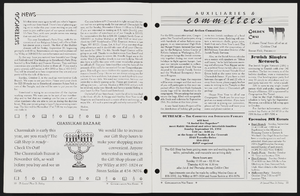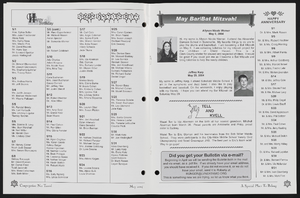Search the Special Collections and Archives Portal
Search Results

Transcript of interview with Kathleen Bryan Gaston by Niki Rodriguez, March 17, 1981
Date
Archival Collection
Description
On March 17, 1981, Niki Rodriguez interviewed Kathleen Bryan Gaston (born 1949 in Las Vegas, Nevada) about her experience living in Southern Nevada. Gaston first talks about her father who moved to Las Vegas and eventually became a justice of the peace, and she also describes how her parents eventually moved to Las Vegas. Gaston later describes how Las Vegas looked as she was growing up and how it has developed since, specifically mentioning the schools she attended and the growth of the Las Vegas Strip.
Text

Floyd Jenne interview, 1996: transcript
Date
Archival Collection
Description
Jenne discusses his birth in Ogden, Utah in 1915, his early life in Northern Nevada in 1920s, and his later life in Boulder City, Nevada working as a reclamation ranger for the Bureau of Reclamation. Jenne begins the interviews discussing his work as a steel foundry worker and miner in McGill, Nevada, studying forestry, and enlisting in the Civilian Conservation Corps at Utah State University in 1934. Jenne then describes his experiences moving to Boulder City and working as a reclamation ranger. Other topics Jenne covers include providing security for notable Boulder City and Hoover Dam (Boulder Dam) visitors and patrolling the area. Lastly, Jeanne talks about the Boulder City Junior Chamber of Commerce, Boulder City's incorporation, and Boulder City law enforcement.
Text

Transcript of interview with Phyllis Webb Clark by Lorna Suzette Clark, April 7, 1976
Date
Archival Collection
Description
On April 7, 1976, Lorna Suzette Clark interviewed her mother-in-law, Phyllis Webb Clark (born 1928 in Los Angeles, California) about her experiences from living in Las Vegas. The two first discuss education, the various address at which Phyllis lived, and the early development of the Strip and Downtown areas. The interview then covers the visits of important individuals, forms of transportation, the effect of World War II on the economy, and the effects of the growing town on hospitality and courteousness. Phyllis also mentions the Helldorado Parade, her involvement in Boy Scouts and Girl Scouts, and recreational activities. The interview concludes with a discussion on the atomic testing, the Stewart Ranch, and floods in Las Vegas.
Text

Transcript of interview with Oliver Crickman by William Hawley, March 3, 1979
Date
Archival Collection
Description
On March 3, 1979, William Hawley interviewed Oliver Crickman (born 1933 in Apex, North Carolina) about his experiences from living in Nevada and working in restaurants. Crickman first describes his background and his first occupations prior to starting as a cook in Las Vegas restaurants. He then explains how he gradually moved from the position of cook’s helper to sous chef and his then-current position of executive chef at the Royal Inn. Crickman goes into detail about the operation of those restaurants and other Las Vegas Strip and Downtown Las Vegas properties, and he describes the demographics of cooks as well as how the hospitality industry has changed over time. The latter part of the interview involves a discussion of Crickman’s various residences in Las Vegas over time, the extent of crime, the first places to shop, and a brief discussion on mobile homes.
Text

Transcript of interview with Earl A. Evans by Lance Malone, March 15, 1981
Date
Archival Collection
Description
On March 15, 1981 Lance Malone interviewed Sears Roebuck Division Manager, Earl A. Evans, Jr., (born March 3rd, 1935 in Alhambra, California) in Las Vegas, Nevada. This interview covers the history of Nevada and Mr. Evans’s life. During the interview, Mr. Evans discusses education, sports, employment, the weather and the railroad in Las Vegas. He also discusses transportation, recreation, community involvement, raising a family in Las Vegas, the development of Fremont and the Strip, and religious activities. Mr. Evans served as a Bishop for the LDS Church in Las Vegas and in regards to education, he served on the Clark County School Board.
Text

Interview with Kenneth Giles, February 10, 2005
Date
Archival Collection
Description
Text

Transcript of interview with Billy Paul Smith by Claytee White, October 3, 2013
Date
Archival Collection
Description
Chemist, mathematician, and health physicist Billy Paul Smith donates time to tutor young people in hopes of attracting more youth into the fields of math and science. Born in 1942 and schooled in segregated black schools in Shreveport, Louisiana, and Texarkana, Texas, he graduated from high school at age fifteen and enrolled at Prairie View A&M University, where he trained with the Reserve Officer Training Corps (ROTC) and earned his Bachelor’s degree in chemistry and in 1964 his Master’s degrees in chemistry and math. Most young U.S. Army officers in 1964 went to Vietnam, but Billy’s math and science background steered him to the Army Chemical Corps, where he was quickly selected to join a new team. The team was to develop responses to nuclear weapon accidents and worked under the Defense Atomic Support Agency (DASA) in Albuquerque, New Mexico. At the same time, Billy completed the Weapons Ordinance Army course on classified information relating to the U.S. nuclear weapons arsenal. In this interview, Billy talks about his service with DASA and his subsequent twenty-seven years working at the Nevada Test Site in a variety of positions with Reynolds Electrical and Engineering Company, Inc. (REECo), a company that had “percentagewise more blacks in management positions than any other [Las Vegas] company.” He experienced the quiet racism of Las Vegas residential segregation when he tried to purchase a house in a neighborhood he liked and the unexpected kindness of the REECo general manager, Ron Keen, who made sure the Smith family could live where they wanted to live. He talks about Area 51 and explains underground testing activity and offers the scientific and ecological reasons why scientists deemed Yucca Mountain safe to store nuclear waste. After retiring at fifty-two, Billy and a colleague formed an independent instrumentation company, which, from 1995–2005 provided and calibrated radiological measurement and detection instruments for the decommissioning and closure of the Rocky Flats nuclear plant in Golden, Colorado. During that time, Billy rented an apartment in Boulder, but he and Jackie maintained their Las Vegas home, where they still reside. Billy shares memories of places he and his wife used to enjoy on the Westside and tells of their longtime friends in the black community. He also talks about developing his philosophy of philanthropy through Alpha Phi Alpha Fraternity and discusses becoming a member of the Knowledge Fund Advisory Council for the Governor’s Office of Economic Development (GOED) and the advisory council for the Nevada System of Higher Education.
Text



